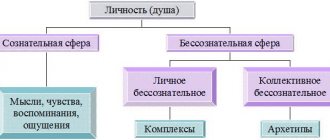Internal anxiety, the difficulties of relationships, haunting failures and failures, psychosomatic diseases that come from nowhere - all this interferes with life, does not allow one to believe in the future and respect oneself, causes not only mental, but sometimes physical pain, and can lead to despair and depression. At all times, mental restlessness, confusion of thoughts and feelings have brought torment to a person and led him to seek help. It was provided by priests and monks, confessors and simply close friends. Today, anyone in need of such support can seek, among other things, professional psychological help .
Those who decide to turn to a psychologist or psychotherapist for the first time have many fears and questions: how they will work with him, what this work consists of, whether he will fall under a kind of “X-ray” that will highlight what a person is not ready to show to another , what diagnosis will be given to him. Work experience shows that all these worries recede into the background, bringing forward a great desire to speak out, to be heard, understood and to receive help - relief from internal pain.
Help from a psychologist is, first of all, an opportunity to get rid of the feeling of loneliness when you are left alone with your problems, an opportunity to talk about them openly, without fear of negative value judgments. After all, the presence of a problem does not characterize you as “bad” or “wrong”, but only speaks of temporary inability, the inability to recognize its true causes and see solutions, which, as a rule, go beyond the usual ideas and patterns of behavior.
An open, confidential conversation about the complexities of life and the feelings experienced, a joint analysis with a psychologist of past events and the present that follows them, the choice of solutions that can resolve a painful situation and ease the suffering of the soul - this is what professional help and support implies, what we offer you .
What kind of psychological assistance do we provide?
We have accumulated extensive experience in solving the following problems faced by clients who contact our center:
Treatment of depression
Psychological consultations and treatment of neuroses
Psychological consultations and psychotherapy for phobias
Psychotherapy and treatment of psychosis
Psychoanalysis of sexual deviations
Psychological assistance to families (couples) and children
Psychotherapy for eating behavior: anorexia and bulimia
Free consultations with psychologists on the psychological forum
The Self from the Point of View of Jungian Analytical Psychology
Photo by Christian Diokno: Pexels
The Self is the most important, central archetype through which all other archetypes unfold. The Self is paradoxical and has the following characteristic features:
- integrity;
- constancy and dynamism;
- conscious and unconscious;
- uniqueness.
Our self always strives for integrity, completeness; it has the image of a circle, a mandala, some kind of harmonious, harmonious, cyclical system, where each part cannot exist on its own.
The Self is an integral part of every person. On the one hand, it is characterized by consistency. On the other hand, the self is constantly changing, developing, giving rise to more and more new archetypes.
The Self is the integral core of personality, although it is expressed in the opposites of each of us: good and evil, intelligence and stupidity, pessimism and optimism, courage and cowardice, male and female, and so on. All this is in each of us, it somehow gets along, then falls apart, then unites, but there is only one center - the self.
Self - how to strengthen the connection with it?
The Self includes our consciousness, that is, that part of our personality that we know about ourselves. But our unconscious also enters into the self, because it is also part of our personality, it influences our actions, thinking, and the decisions we make.
Thus, our individuality, our uniqueness, is embodied in the self, the self is the essence of our personality.
How do we help?
We offer professional psychological assistance in the form of psychological consultations and long-term psychotherapy.
The difference is that consultations can be one-time in nature and devoted to a specific narrow topic stated by the client. Psychotherapy is long-term, in-depth work focused on the client’s personality. Psychotherapy with elements of psychoanalysis helps to identify the origins of problems, understand them, and carry out deep changes in character that inhibit personal development and interfere with a full life.
Depending on your personal preferences and recommendations of the psychologist, you can choose one of the proposed forms of work.
Mother
This archetype cannot be taken literally (like all the others). It, of course, can manifest itself in the mother, but it can also manifest itself in the grandmother. In other words, in everything that is associated with the word goddess.
This archetype is reflected in things that evoke a sense of awe. For everyone they are different: for some it is the state, for others it is the church, for others it is the university.
Archetypes evoke opposing emotions. So, in addition to reverent symbols, evil ones are also highlighted. Among them are witches, death and ghosts, brownies, sarcophagi and deep waters.
Good symbols include care and sympathy, feminine wisdom, and support.
This archetype is associated with resurrection, as well as magic.
Background
When your soul hurts and your thoughts are racing, the main thing is to achieve a happy balance with the world of people and with yourself. The institute of “helping the soul” has a centuries-old history, but it is assistance based on the achievements of special research, using various techniques, that dates back a little more than 100 years.
The reason for the emergence of psychological help as such, the need to turn to it, was formulated by Erich Fromm, a German philosopher, social psychologist and psychoanalyst: “Man is the only animal for whom his own existence is a problem.” This problem was resolved by different schools of knowledge: from Eastern to Western and European. Psychological assistance in its development went through two periods: the religious-mystical and the stage of modern scientific psychotherapy.
Initially, the “problem of existence” was solved using the methods of religious traditions. The search for its origins was carried out solely on the basis of ideas and dogmas. Appropriate methods for solving were proposed: for example, meditative practices in Eastern teachings, so-called metaphorical communications used by both Eastern and Western schools - the Sufi parable “The Tale of the Sands”, “Ten Bulls of Zen”, fairy tales, parables, sayings, everyday narratives . Trance communications were also used based on rhythmic monotonous actions or repetition of words - ritual dances, chanting mantras, prayers; hermeneutical procedures - fortune telling on cards, runes, etc.; body-oriented methods - for example, yoga; sacred symbolism - the use of totems, amulets, appeal to the symbolism of religious services; the phenomenon of catharsis - for example, the process of confession, talking through a problematic situation.
All these methods, enriched with scientific knowledge, are still used in one form or another, bringing positive results. Thus, metaphorical communications are reflected in fairy tale therapy, body-oriented methods are used both as a separate direction and in combination with psychoanalysis; elements of catharsis are easy to observe during a consultation - one of the forms of help from a psychologist.
If life has stopped making you happy and has lost its meaning, if relationships with loved ones have turned into a series of quarrels and deep mutual resentments, if you are having a hard time with yourself and you don’t see a way out of the situation, it’s time to seek psychological help. Finding the source of mental pain, realizing the real problem, changing habitual patterns of behavior - this is the path along which we invite you to walk together. “Change your thinking and you will change your life ,” - during the consultation process you will definitely appreciate the correctness of these words of Brian Tracy.
______________________________________________________
Psychology first hand: psychological publications
Love or neurosis?
We all want to love and be loved, if we succeed, we feel happy. To this extent, the need for love, or more precisely, the need to be loved, is not neurotic. In a neurotic person, the need to experience the love of other people is exaggerated. If the people around them are less kind than usual, this spoils the mood of a neurotic and causes phobias or severe depression. He clings to people... He may need psychological help and psychotherapy. It is important for a mentally healthy person to be loved, respected and valued by those people whom he values; neurotic need for love is obsessive and indiscriminate
How to deal with stress?
When stress becomes chronic and mental symptoms develop, it becomes obvious that something needs to be done. Coping with stress can take many forms: from desperately trying to find a way to “relax” to seeking help and support from loved ones. Sometimes the desire to escape from stress leads a person to what could be called destructive methods of self-support - drug addiction
Psychological consultation
What happens during a consultation with a psychologist is certainly not magic. In a serious process of psychological counseling, the client, together with the psychologist, sooner or later becomes able to work on his initial - sometimes hidden, sometimes explicit, “magical” expectations regarding his psychologist and psychological counseling in general. Then comes the realization that the paths of psychological change are not so much magical and supernatural, but rather human, depending on two people who, being next to each other, are able to talk about something really important, relating not to something beyond, but to what is happening between them
How to diversify relationships? Psychologist's advice
If your sex life has become monotonous and predictable almost to the point of disgust, take immediate action. Let sex be the first thing you do in the morning, not the last thing in the evening. Do this in a new environment, in new underwear, in a new mood. Even the most amazing lover will get bored if you have learned all his tricks by heart. In the initial period of an intimate relationship or marriage, there was no talk of monotony. Mutual attraction and impatience forced them to have sex in different settings and with all possible variety of positions and techniques. However, over time, what was new became familiar and even boring.
The benefits of the unconscious
If we simplify the consideration of the term and do not go into scientific terminology, then the unconscious is a set of instincts. Yes, instincts are associated with something animal, wild. It is unlikely that many are proud of the fact that they are partly similar to animals.
Although in fact, the presence of instincts brings great benefits to a person. For example, in dangerous situations when a lightning-fast reaction is required, it is instincts that can save you from a depressing outcome.
Although, of course, it is not worthwhile to completely leave a person’s life to instincts if he wants to live normally in the society of people.
Prototypes Mask and Shadow
The name of the archetype “Mask” translated from Latin means “mask” or “public face”. In other words, this is a verbal version of a person’s manifestation within the framework of relationships with other people.
The mask is a symbol of the roles played by a person. This takes into account existing social functions.
According to Jung, it serves the purpose of making an impression on people around him or hiding his essence from them, as far as possible. A person needs this prototype to get along with others in everyday life.
Jung's archetypes, the list of which is extensive, are used by psychologists taking into account the following point: the “Mask” subtype is endowed with significance. Due to it, a person becomes superficial and remains alienated from emotional experience.
The imaginary type “Shadow” is the opposite of “Mask”. This is the dark side of human souls (people tend to suppress it). A positive feature of this subtype is its ability to be a source of vitality.
According to Jung's concept, the main function of the ego is to correct the direction of the energy of such an archetype. The negative side of human character is also curbed.
Sage
In this psychological archetype, Carl Jung reflects a person’s desire to gain knowledge and find answers to pressing questions. It is not for nothing that in world culture the image of elders has been assigned to sages, similarly to the prophets.
This archetype is activated when a person is faced with a choice. The more similar life situations he experiences, the more the Sage archetype takes root in him.
Baby
The baby archetype is associated with the future. For example, heroes of myths are often represented as infant gods who must pass through darkness to achieve their goals. The darkness in this case is the unconscious part, which the archetype seeks to get rid of.
In other words, the baby is the conqueror of the dark. He is often portrayed as promoting culture. Characteristic attributes: fire and metal (blacksmithing) or grain and corn (agricultural cultivation).
Also, a baby is often associated with salvation, because according to Jung this symbol appeared as a result of the interaction of two opposites - the unconscious and the conscious, and as was found out earlier, it is this connection that allows a person to be viable and saves him from death.
True, there is another side to the archetype, which manifests itself in abandonment and insecurity. Being the fruit of the interaction of two opposite principles, the baby was at first abandoned by both the unconscious and the conscious. This is where negative associations of the archetype arise.
Types of Witch and Jester
Psychologists identify archetypal images of the witch and the jester. The mythological type of witch is an instinctive prototype , symbolizing the need to study the world.
People belonging to this type are interested in esotericism and religion. They are also fascinated by the mysteries of existence. They prefer to surround themselves with amulets, and also wear tattoos and amulets. Carriers of this archetype are distinguished by good intuition.
Included in the archetypes and shadows according to Jung is the “Mary Poppins” subtype (this is the bright side of the image of the witch). This type is demonstrated in the film “Muse”. This type is not capable of cunning and leading other people.
A distinctive feature of the “Jester” archetype is the ability for creative thinking and an unconventional view of things. Jung's theory, which is used by psychology and philosophy, includes many subtypes, but only the jester type is easy to relate to life.
This type is distinguished by impulsiveness and some spontaneity in the actions performed. Due to the playfulness inherent in the “Jester,” representatives of other archetypes may accuse him of immaturity and lack of desire to grow up.






